The Truth About Leaving A Fishing Lure In A Fish’s Mouth (STUDY)
- By: Joseph Simonds
- on
- Found In: Conservation, Fishing News, Fishing Tips, Salt Strong
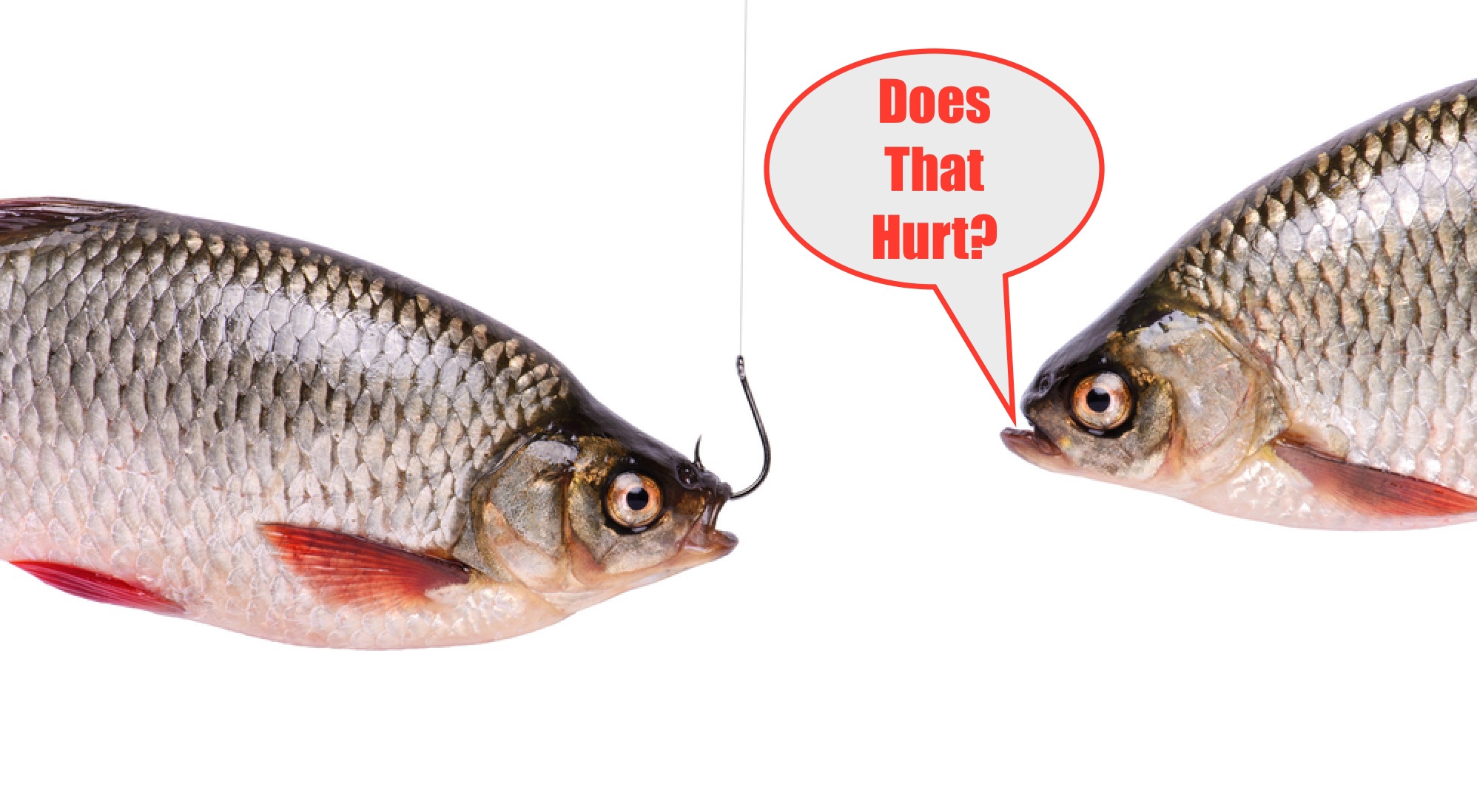
Before we get into the somewhat shocking (and certainly controversial) results from a recent fishing study that purposely left fishing lures/hooks in a fish’s mouth to see how they really react, let’s get one thing straight first…
By NO means are we (or the research team that did the study) trying to encourage anglers to casually leave fishing hooks or lures inside of a fish’s mouth (unless you are certain it can help save their life as you will see in the study below).
This is purely informative to those of you always wondering what happens when a lure or fishing lure/hook is left in a fish’s mouth. And let’s face it, there are some pretty unavoidable instances where a hook accidentally gets left in a fish’s mouth…
Not to mention, sometimes it can actually save the fish’s life!
So PETA, don’t get your waders in a wad just yet…
(If you never read the Salt Strong Open Letter To PETA regarding their pursuit to stop ALL Catch & Release Fishing, click here to read that next. It is a must read for all anglers).
Reasons Why Hooks Get Left In A Fish’s Mouth
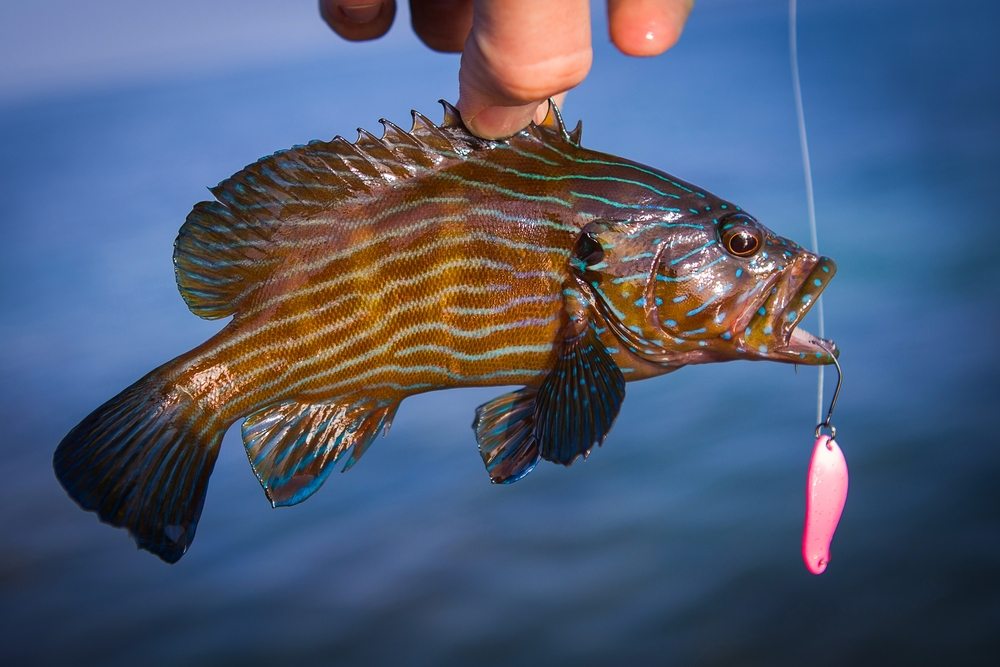
If you have spent any amount of time saltwater or freshwater fishing, then you know that eventually one of your hooks or lures will end up in a fish’s mouth well after the fight.
For those of you non-anglers, here are just a few reasons that hooks and lures get left or caught in a fish’s mouth:
- While fighting a fish, the line breaks, leaving the fish swimming off with the hook/bait/lure
- This could occur from fish going into structure and breaking you off
- This could occur from a bad knot
- This could occur from just a normal break-off with a big fish at any point during the fight
- This could occur with fish like sharks, barracuda, or pike that have sharp teeth, etc
- The fish swallows the hook to the point you can’t safely get it out without seriously injuring or potentially killing the fish
- Many fish with nasty teeth (like large sharks and freshwater pike) are released by purposely cutting the line at the hook instead of keeping the fish out of the water for an extended period of time (and to avoid getting your hand bitten)
Learn more about the Insider Fishing Club
Fishing Lures Left In A Fish’s Mouth [Study]
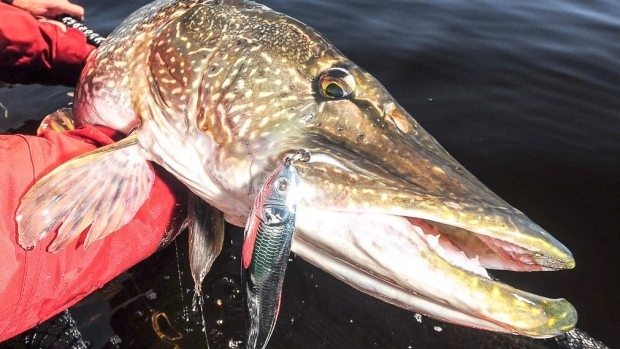
Wait until you see the results from this latest study on fishing lures left in a fish’s mouth!
Here are the details of the study:
- Canadian Grad student Chris Pullen did his thesis project on how long do fishing lures/hooks stay in a fish’s mouth if left to fend for themselves.
- The entire study was done with Northern Pike.
- Chris had “control” fish (also Northern Pike around the same size/age) as well that had no hooks in them to see if they would act differently than the pikes with hooks in their mouth
- In the study, Chris hooked pike in four different parts of the mouth with color-coded crankbait lures fitted with radio transmitters.
- He used these floating crankbaits in a controlled lake (so they could see the crankbaits float to the top once the fish shed them, and also so they could monitor and follow up on all of the fish)
- They used both barbed hooks and barbless hooks
- They hooked the fish in multiple places in their mouth:
- Lower jaw
- Through BOTH the upper and lower jaw together (with the treble hooks)
- Back near the top of the fish’s tongue (deep in the Pike’s mouth)
- Once hooked, Chris released the hooked fish back into the small lake so they could start tracking how the fish reacted with the lures in their mouths.
- The study was supervised by Dr. Steven Cooke and the Fish Ecology and Conservation Physiology Lab at Carleton University. The field work was done at the Queens University Biological Research Station (QUBS).
Here are the actual crankbaits he used in conjunction with the Carleton University’s Cooke Lab:
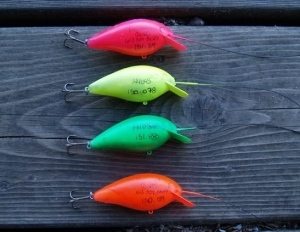
Then you’ve got to see this private fishing club! Here’s what you’ll receive today:Do YOU Want to Catch More Fish this Summer?
Click here to join today.
The Results:
The results of this “crankbait left hooked in fish’s mouth” came back pretty shocking!
These fish were all somehow finding ways to self-release (or most likely shake out) well set crankbait treble hooks in a matter of days. In fact, the barbless hooks usually came out of the fish’s mouth and hit the surface in 24 hours or less!
And even the deeply hooked crankbaits with barbs were usually fully free from the fish’s mouth in just a couple of days!
Pullen said the pike hooked in the lower jaw actually took longer to shed the lure than those hooked deeply near the back of the tongue.
Chris’s theory is that the hook in the jaw is less of an annoyance than one that is deeper and impacting their ability to forage, so the fish doesn’t use as much energy to try to release it from their mouth.
“We have a pretty good idea now, for pike at least, with crankbaits, what likely happens with the lure,” he said. “And that is faster than people might think, that fish is able to get that hook out.”
Pullen concluded from his study that anglers wanting to release a fish safely are likely better off cutting the line on a deep hooked pike then trying to pull out the hook itself.
It appears that fish are pretty good at finding ways to remove these hooks while under water! Pretty amazing for an animal without any hands or fingers!
Finally, in the second part of the study where Chris followed and compared the pike with hooks/lures in their mouth vs the normal pikes (he tracked their behavior in terms of how they dispersed around the lake, how they acted, and how they ate), he found very little difference in how the hooked vs unhooked pike acted.
This would explain why so many anglers have stories of catching the same fish in the same hour. Apparently, fish might feel some annoyance with the hook in their mouth (enough to find ways to shake it off), but it certainly isn’t affecting their ability to eat and to go about their daily life.
You can read a little bit more (and hear the short audio interview) about this fascinating fish study with Chris Pullen here.
How Long Does It Take For A Fish Hook To Dissolve?
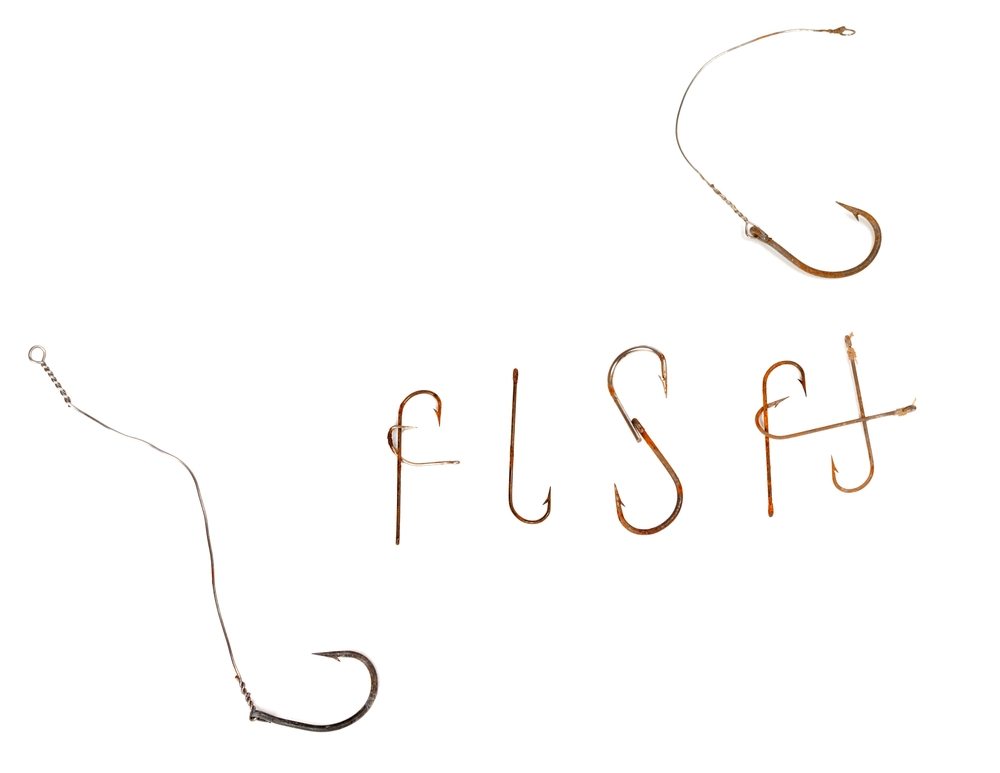
Although there is much debate on this, the long and short of it is that there is a better chance of the fish losing or shaking off the hook before it dissolves (as Chris proved in his pike research above), especially the newer hooks that were not made to be “biodegradable” (there have even been reports of fish “pooping” out hooks).
The long and short of it is, most fish hooks are going to take a LONG time to completely dissolve.
Will they rust, weaken, and be more bendable?
Of course!
But to completely dissolve is another story. Try it yourself… go put a hook in a cup of saltwater and a cup of freshwater and see how long it takes to erode… you might be waiting a long time…
Below is a great answer from Yahoo Answers that explains how long it takes for a fish hook to dissolve in a fish’s stomach (in laymen’s terms).
A few of the variables to think about when it comes to a fish hook actually dissolving:
- How new is the hook?
- Older hooks will rust or dissolve quicker than brand new hooks.
- What is the hook made out of?
- Old wire hooks will dissolve quicker than a stainless steel hook.
- How big is the hook?
- As you can imagine, a smaller hook will dissolve and weaken quicker than a large hook
- Is the hook in saltwater or freshwater?
- Saltwater will dissolve a hook faster than freshwater
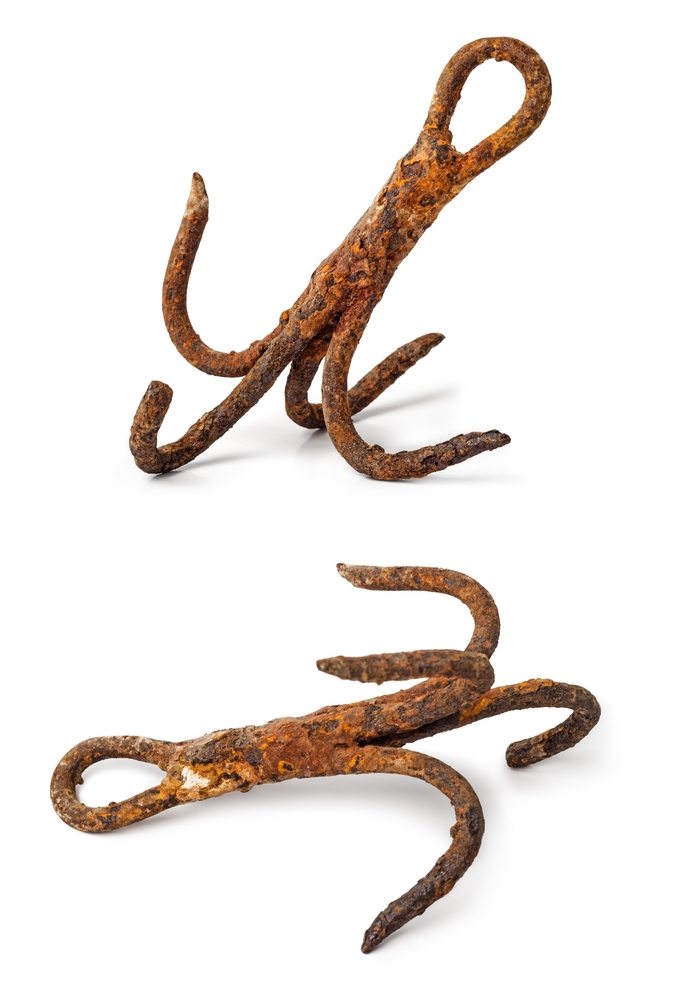 Find out all you need to know about catch and release fishing, including what to do with deeply hooked fish here.
Find out all you need to know about catch and release fishing, including what to do with deeply hooked fish here.
How Long Does A Hook Take To Dissolve In A Fish’s Stomach?
Question From Yahoo.com Answers
Best Answer From Peter in Australia:
A hook will rust away in a fish, but it may take a while, especially if the hook is plated or made of thick metal. But fish’s stomachs are pretty tough. They can stand up to the spines on little fish like bluegill or pinfish. I’ve caught lots of fish which have hooks embedded in their jaws, and I’ve cleaned quite a few fish which have grown-over hooks in their guts. So cutting off a swallowed hook is not really a big deal. But if you worry about it, make sure you use thin wire, non-plated hooks.
And no, fish’s nervous systems are not especially similar to ours. I’ve actually seen the same fish caught twice within an hour (we were tagging small halibut, so we know they were the same fish and when they were caught), so hooking a fish doesn’t bother it much at all. You also see this in the big fish tank bass fishing exhibits you see at fishing shows. And of course, fish have lateral lines, we don’t. They are very different creatures.
Finally, I’ve caught a number of fish which were never hooked: lingcod which have grabbed a smaller hooked fish, or wahoo which are simply holding the middle of a metal jig, with the hook swinging free. These fish pulled the same as fish which were hooked, and held on until they were gaffed or netted. All this tells me is that they’re fighting the pull of the fishing line, not the “sensation” of the hook, and they were not bright enough to let go when it became obvious they were in danger.
Conclusion
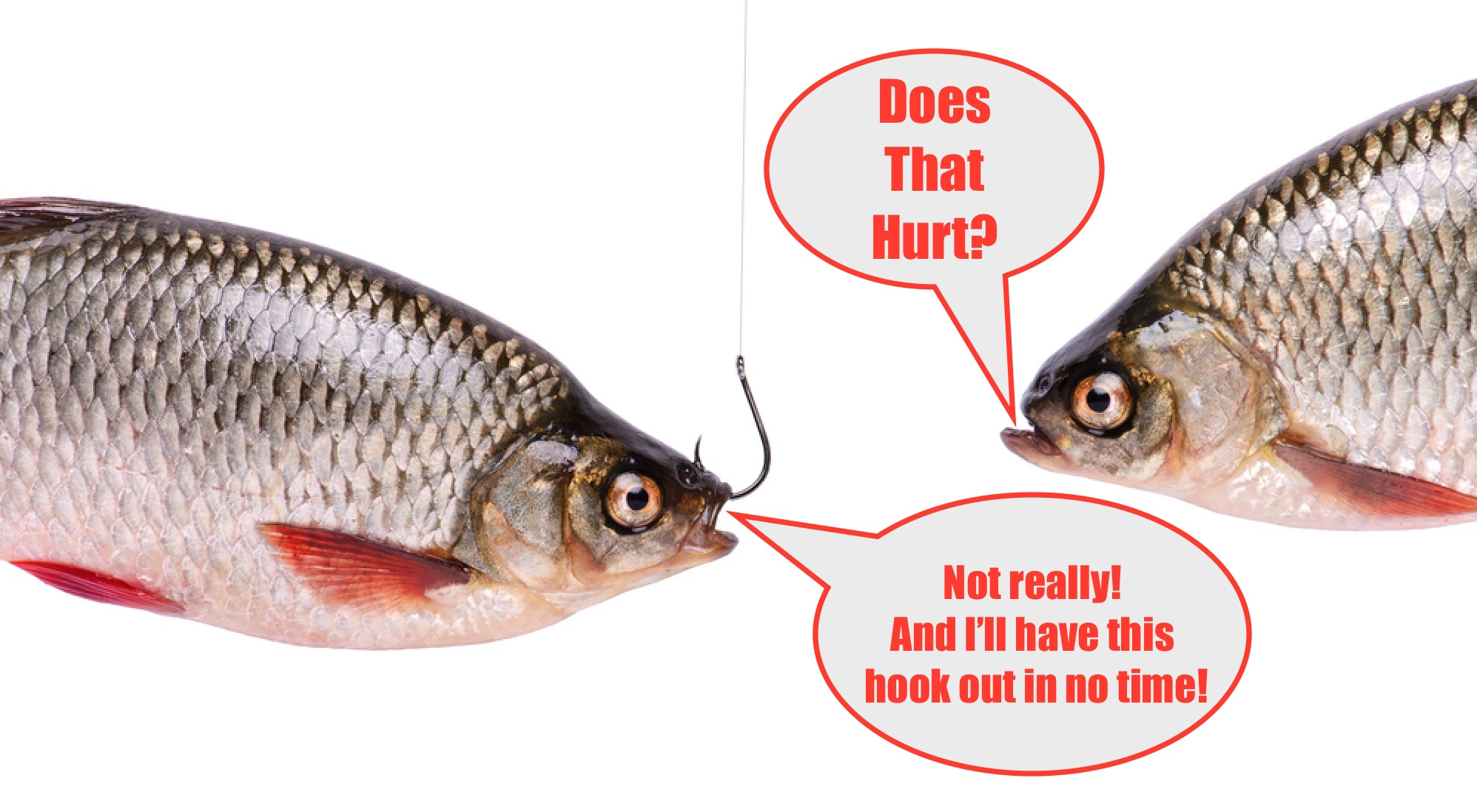
First and foremost, if you can get the hook or fishing lure out of a fish’s mouth with minimal issues or harm to the fish, then by all means, ALWAYS take it out.
But if you believe the fish that you are releasing might not make it if you keep them out of the water any longer, many times it is best to just cut the line.
As the recent study on Northern Pike proved, not only were the hooked fish able to disengage the hooks, they also didn’t appear to be eating or acting any differently than fish that were not hooked.
Finally, does this eye-opening study showing Northern Pikes being able to somehow shake off well set treble hooks in a matter of days mean that ALL fish can just as easily shake off all hooks?
Of course not!
But it certainly is an incredibly interesting insight into how quickly these fish can recover and shake off treble hooks!
Learn more about the Insider Fishing Club
Related Post:
1. How To Properly Catch & Release Fish Without Killing Them (see it here now)
2. The Complete Guide to Catch, Photo, & Release Fishing
3. The Best Catch and Release Techniques (Backed by Science)
P.S. – If you think your angler friends would like this post, please Tag them or Share this with them. It would mean a lot to me. You Rock! Pa-POW!
Then you’ve got to see this private fishing club! Here’s what you’ll receive today:Do YOU Want to Catch More Fish this Summer?
Click here to join today.
Related categories:
STOP WASTING TIME ON THE WATER!
Do what the “SMART ANGLERS” are doing and join the Insider Club.
Here’s what you’ll receive today when you join:
- Weekly fishing reports and TRENDS revealing exactly where you should fish every trip
- Weekly “spot dissection” videos that walk you through all the best spots in your area
- Exclusive fishing tips from the PROS you can’t find anywhere else
- Everything you need to start catching fish more consistently (regardless if you fish out of a boat, kayak, or land).



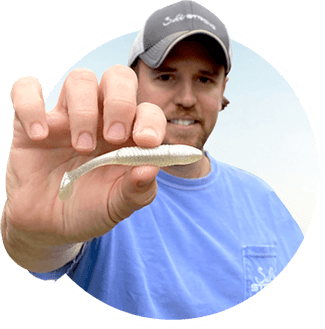





I just released a 2 ib Bull that swallowed the and hook so deeplyI felt manhandling and digging for hook would be worst than cutting the line. Fish left instantly what are his chances I feel horrible as was a trout that is illegal to keep in Idaho
As I got older and respected life much more I try and help where I can. Removing hooks from shorts, meaning non-keeper fish, is always a must. Some fish just won’t make it, but will become dinner for some other critters and the circle of life goes on. I’ll buy wire hooks that will rust out and release the fish from any added discomfort. I appreciate written articles in magazines that promote this kind of caring.
pike are a pain… if your bait is not HUGE.. they will gulp that thing and it will be stuck deep in their mouths and hooked on the inner part of their gils … those mother flowers are NOT shaking those hooks. – especially a three hooked rapala type lure
I mean, the lures used in the study were essentially Rapala trebles.. looks like they didnt have the front hook, but the picture is there in the article..
Another great article. Thank you.
And for anyone interested in Chris Pullen’s full Thesis:
https://curve.carleton.ca/system/files/etd/ce20574d-c177-48d3-bb34-5648ab013630/etd_pdf/0ee2354d95189c37480af6a1a14bb686/pullen-theconsequencesofretainedluresonfreeswimming.pdf
Feeling better after losing a pike tonight, snapped line, and leaving a spinner (treble barbed hook) in its mouth after reading this. Thanx for the study.
ya i had this happen before
I concur that hooks left on Fish eventually will
come loose by way of rubbing off or what I believe dissolving because of body acids god has given these creatures to exist !
Short true story
During the 60s when fishing bass at a friends cottage , I hooked a beautiful small mouth bass , when getting him beside the boat , a friend grabbed hold of the line and of course the fist broke the line and swam off with my black jitterbug lure . This was in a bay 3 bays from where we were staying.
This could be for Riplys believe it or not .
This was a annual get together at this cottage with old neighborhood friends .
NOTE :::The following year July 1, weekend 7 of us were
Sunbathing on the dock and shore , while laying on my stomach looking over the water I noticed something odd off in the distance floating in the water, got in the boat and went and retrieved my black jitterbug , missing were the front and rear treble hooks .
Whenever those of us are together we reminisce about this adventure 👍🇨🇦
I believe that crankbaits fish can use the weight of the bait to throw the bait, plus small trebles dislodge easily. Not true with large worm hooks with no bait attached, threw the worm. Nothing surprising in that study. Do the study again with a large, good quality worm hook with no bait attached. It will still be in a bases mouth month’s later. Fish hooked in the stomach are going to die unless you cut the hook with a long handled side cutters and rotate out. I have caught very skinny bass with a hook coming out their anuses that all looked like new.
I fish for native trout witch are true wild trout in Virginia. Many times I have throut hooked them and have cut the line and released them back to the mountain stream. My worry is that they will die because of the hook left in. Does anyone have any information on the servival of native trout living with the hook left in it’s throut?
I have proof of it happening to me , and I have just posted my experience earlier , although not on trout on small mouth bass , I believe god gave fish a survival chemical to attack such
foreign matters ..
If you find another reasonable answer, please forward to me .
sup[ bros